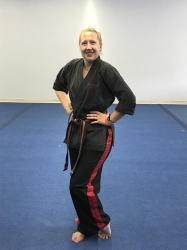
- The Power of Deep Thinking, Martial Arts, and Personal Growth - February 18, 2025
- Friend or Friendly - August 26, 2024
- From Kicks to Kisses: How Marrying a Non-Martial Artist Redefined My Training - July 29, 2024
In theory, it may seem simple to listen to someone. In practice, it requires one to be humble and quiet in any internal dialogue, to be present in the moment, and to listen genuinely. Although it may be harder for some than others, it is essential to listen with kindness intentionally and do the best one can.
It was early in my post-doc career that I came upon an article that discussed the different types of listening.

You can find the article here: https://doi.org/10.1177/16094069211020903
I often refer to the above picture of that specific paragraph to remind myself of the importance of self-awareness and knowing what’s worth fighting for. I share this concept with the leadership team as it is essential not only when communicating with students but also with anyone.
The three modes of listing simplified are:
- compassionate – active
- cataphatic – interruptive
With these two modes of listening, the listener doesn’t need to act on what they hear. This kind of listening can be seen as a way of oppressing others because the listener can choose to ignore or misinterpret the information they receive.
- apophatic – requires the listener to remain curious and open
On the other hand, this mode of listening requires the listener to engage with what they are hearing and respond appropriately, helping them build better relationships with others.
Understanding the distinction between how others perceive things and how you interpret them can help you determine whether you should react or respond. This is particularly significant for martial artists since they are expected to display self-discipline in all circumstances. Listening to more than the words coming from the individual creates the space to ask yourself a few questions.
One of my pastors put it this way: THINK.
T – Is it true?
H – Is it helpful?
I – Will it inspire change?
N – Is it necessary?
K – Is it kind?
Think before you act. How many times have we heard this phrase or said it ourselves? It all boils down to the fundamental question: is this topic worth fighting over?

When should one choose to fight, defend themselves, or just let the situation take its course? It’s important always to do the right thing, but is it worth a physical altercation or harsh words if it’s only hurting your feelings or emotionally impacting you? However, if someone you love is being physically harmed, then it’s essential to act. No one likes their name being dragged through the mud, and it’s not something you hope anyone would wish upon another person. We are all valuable individuals with worth, even if we don’t agree with each other or “vibe” with one another. It’s okay to disagree or not be friends with someone, but it’s never okay to speak ill of them and cause others to have a negative perception of them. If it’s not done out of physical protection, it’s not honoring the person you’re speaking to. Sometimes, it’s better to stay quiet and walk away rather than engage in a pointless fight that won’t benefit anyone.
Many situations can be defused simply by agreeing with the comment or walking away. Humans all have the same fundamental needs. To be seen, to be heard, and to know they are loved.
So, listen.
If they say something that you know is not true, as my father would remind us to say, “I’m not a tree,” laugh to yourself and walk away. It is ridiculous and shocking but often defuses the situation. You do not have to agree, but sometimes a kind word can genuinely change the direction of what could turn into an altercation. Sometimes, unfortunately, open hands and an “I don’t want any trouble” attitude are not enough. If someone touches you or introduces a weapon, a physical response is necessary.
That is the discernment of self-control, a side effect of having a Black Belt spirit. To know you’re not a punching bag; you’re worth fighting for. Knowing it is essential to stand up for oneself, but only when it’s vital, not just to boost one’s ego.
“No touchy” is not just a quote from The Emperor’s New Groove.
Remember, hurt people tend to hurt others. It’s important to know when to walk away from such individuals. This is not an excuse for their behavior but rather a decision based on what is best in the long run. Knowing when to fight is a fine line, and it can involve various factors. Self-control is the key to distinguishing between acting on one’s intrinsic thoughts of violence and choosing to fight for oneself or loved ones’ safety. It’s important to know when to attack the attacker to ensure that you get home safe. When you question whether it’s worth fighting for, remember that karate encompasses more than just physical combat. Before resorting to violence, take a moment to pause and truly listen to what the other person is saying.

Leave a Reply